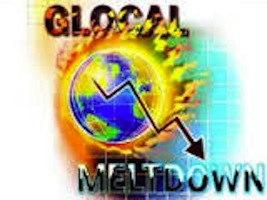Don’t the buy the media line that the volatility in global markets is all about oil. It’s not. Not even close. The fast-moving meltdown in those markets resulting in global recession is the eventual price world economies will pay for chronically injecting cheap money into the market for the last decade, artificially pumping up the economy and masking the spreading cancer below the surface. Now, six weeks into the new year, the mad swings in the markets will more and more center on the banks. Watch the banking crisis as it unfolds. Global stock indexes have plunged into bear territory, currencies are crashing – and as commodity prices tumble, resource-rich nations going broke are begging the World Bank and International Monetary Fund to bail them out. Neither “The Panic” nor the Global Recession, one of our Top Trends for 2016, will spare any country, large or small. We are looking at a Global Recession turning into a Global Depression. And when all measures fail to revive the economy – “they take you to war.”
Trends This Week – The Economic Meltdown: It’s Global. Period. – 01.27.16
Want to know the truth behind those wild swings in global markets? Listen to this program with global master forecaster Gerald Celente. The facts prove it. With just three trading days left in January, in the history of the Dow Jones, there has never been a new year that has rung in on such a down note. And the wild market ride has spread far beyond Wall Street. Just one week ago, the global equity rout sent the MSCI All-Country World Index into bear territory. From China to Japan, from the UK to France, stocks were down more than 20 percent from 2015 highs. Among the higher-risk emerging markets, stocks dove to their lowest levels since May 2009. Overall, some $15 trillion in global equity values has been lost since the year began. Beyond diving equities, commodity prices are down to 1991 levels, according to the Bloomberg Commodity Index. Thus, among many resource-rich nations whose exports have sharply fallen along with the prices of the commodities they sell, their currencies’ value also has dramatically declined. There’s a rough ride ahead. Prepare. Prevail. Prosper.
Mike Shedlock – Debunking the Myth “Consumer Spending is 67% of GDP”
Consumer Spending Myth It is widely believed that consumer spending accounts for approximately two-thirds of the economy. A few of us dispute that claim. Reader Gary writes “You had made the comment more than once that manufacturing is really a much larger part of GDP than is frequently quoted. I could not find how you got there, but ZeroHedge has …
Himalayan locals sustainably cultivate natural aphrodisiac as Big Pharma seeks to cash in
High up in the Himalayan mountains, hidden in the quiet pastures, grows a rare medicinal fungus. Speculators from around the world have heard what the fungus can do. (It’s a powerful aphrodisiac.) They have learned how valuable it is. (It’s more valuable than gold in the Chinese markets.) It’s an understatement that Big Pharma’s eyes are getting big – their …
Welcome to 2016! With Just a Touch of Mayhem
In China, stocks crashed on day one of 2016. No one really knows why. Some hardy souls blamed the manufacturing index that came in even lousier than in November. But manufacturing has been consistently lousy, and bad numbers are nothing new and not a reason for the sudden plunge in stocks. Whatever the reasons, the Shanghai Composite plunged 6.9%, the …
Isaiah J. Poole – Millennials in Poll Fake Right, Go Left
At first glance, a poll released this week by USA Today and Rock the Vote, done by Ipsos, seems to confound our narrative that a majority of millennials identify more with progressives than conservatives. In fact, when asked that question point-blank when it comes to economic policy, 38 percent of respondents in the poll identified as conservative to some degree, …
The Gary Null Show – 01.13.16
Dr. Jack Rasmus is a professor of political economics at St. Mary’s College and Santa Clara University in California. Prior to teaching, he was an economic analyst for several global corporations and an organizer, negotiator and business representative for several labor unions. At one time he was elected at the National First Vice President of the National Writers Union. In addition to his economic profession, Dr. Rasmus is a playwright and author of fictional works dealing with social struggles, and the owner of Kyklos Productions. He is the author of several books, most recent being “Systemic Fragility in the Global Economy” which explores why mainstream economic analysis repeatedly fails and why we have been incapable of producing a sustainable recovery and economy. Jack also hosts a radio program “Alternative Visions” on the Progressive Radio Network every Friday at 3 pm Eastern time. His website is JackRasmus.com
BOOK: “Systemic Fragility in the Global Economy”
RADIO PROGRAM: “Alternative Visions” on the Progressive Radio Network every Friday at 3 pm Eastern time.
WEBSITE: JackRasmus.com
Quentin Fottrell – Most Americans have less than $1,000 in savings
Americans are living right on the edge — at least when it comes to financial planning. Approximately 62% of Americans have less than $1,000 in their savings accounts and 21% don’t even have a savings account, according to a new survey of more than 5,000 adults conducted this month by Google Consumer Survey forpersonal finance website GOBankingRates.com. “It’s worrisome that …
Paul Buchheit – The Real Terrorists: The .01%
They consist of 16,000 individuals, about the size of a crowd at a professional basketball game. The inequality horror they’ve fomented is reaching far beyond the half of America that is in or near poverty, for it now impacts those of us well above the median, those of us in the second highest of four wealth quartiles. 1. The .01% …
“Future Economic Historians” Will Probably Call the Period That Began In 2007 “the LONGEST DEPRESSION”
Sure, last year was the first pre-election year stock market loss since the Great Depression. And admittedly, this week was the worst opening week of any year … EVER. But that’s not the big news. The big news is that a prominent economist – University of California economics prof Brad DeLong – wrote today: Economist Joe Stiglitz warned back in …










